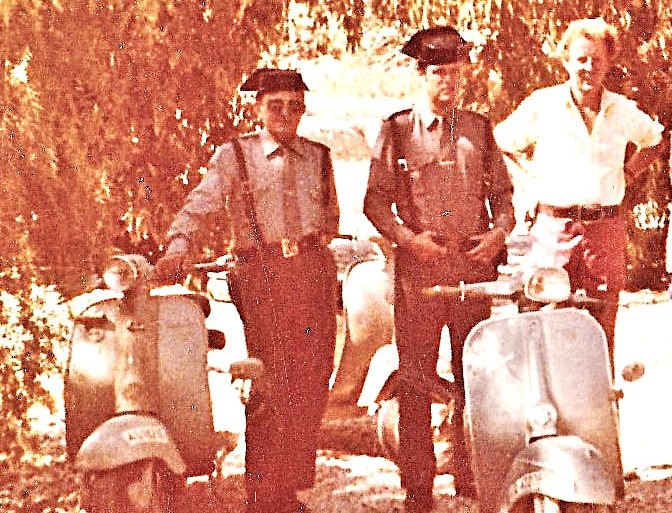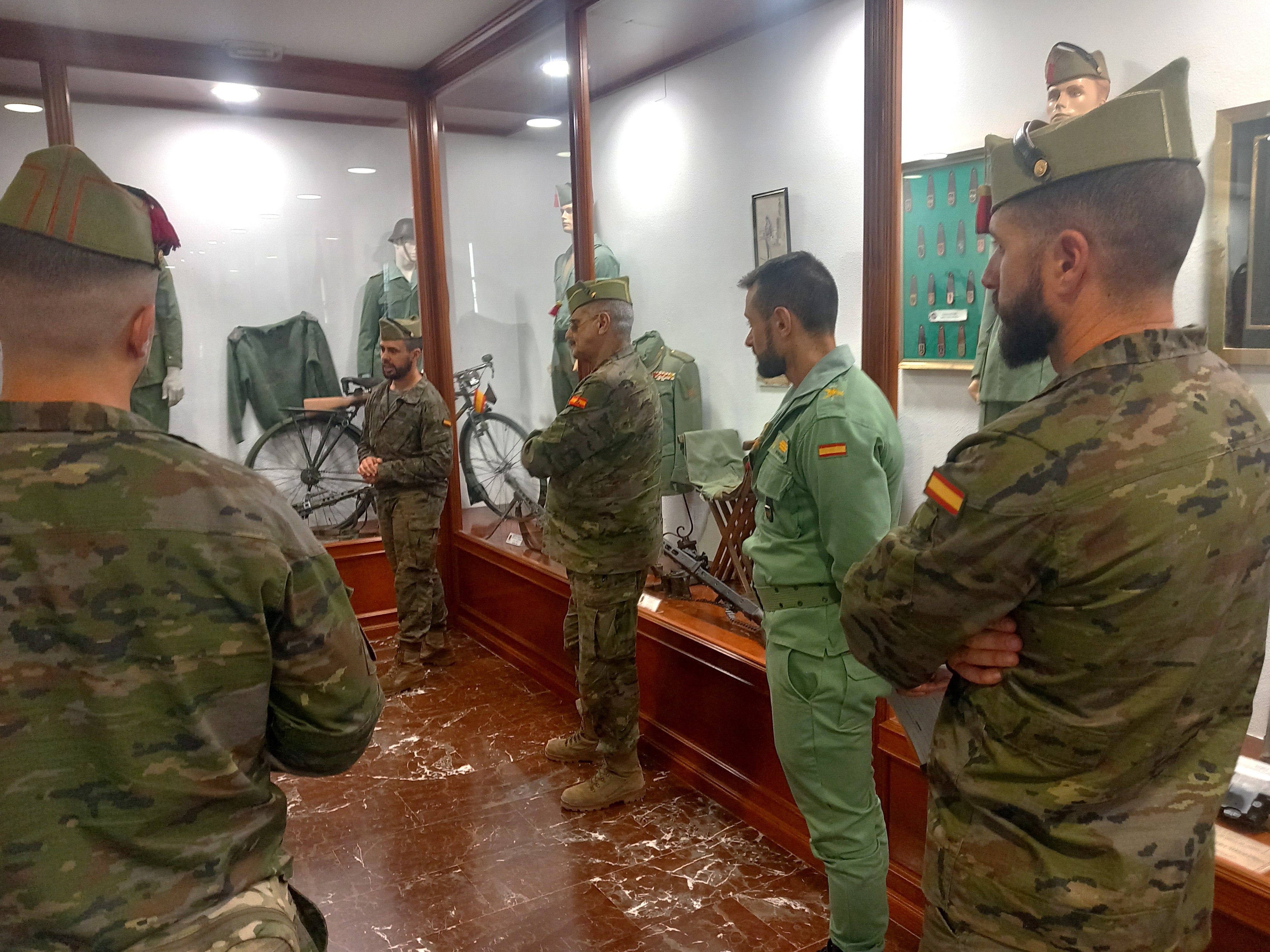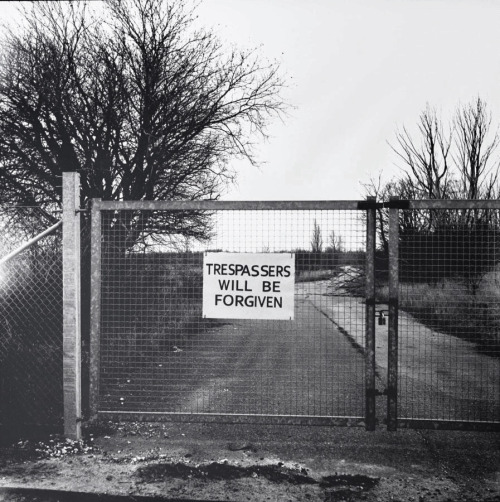Strike a Light Gov.
Tuesday, April 29, 2025
I followed my own advice a few weeks ago and bought a torch and a few cans of baked beans, put a battery in the radio and – what was the other thing?
Ah yes, picked up a Teach-Yourself-Russian primer.
But it’s funny how things turn out.
I was in Kraichgau in Germany this Monday, riding an e-bike along a quiet country lane when the mobile phone went off in the Karrimor – a kind of bicycle side-pack.
These calls – no one I know ever phones me – are usually from one of those scam outfits that either want to sell you something you never realised that you could do without, or worse still, a complete hollow silence from the caller: probably cleaning out your bank account details as you wonder whether to say ‘Yeah?’ or just hang up.
I block ’em when I get ’em, but if I’m doing something else, then I don’t bother to answer.
Who does these days – if someone knows you, they send a message or make a call on WhatsApp.
Pedalling away with Lotte just in front of me, i hear that my mobile is insistently trilling once again.
'Hold on', I call to her.
Long story short, it’s my neighbour in Spain, a slightly dim-witted fellow called Paco. Salt of the earth, but not always fully up to speed.
‘The power is out’, he said.
‘Well there’s fu-’…
‘And in your house too’.
Shit, did I give him a key?
‘Can you call Endesa, the electric company?’ he’s saying.
‘Paco, I’m riding an e-bike, and it’s still going strong, so I reckon I've got more than enough electricity. You call them’.
I get a message some time later, laboriously written by Paco, which says (roughly) ‘there’s no electric on the beach either’.
Lotte has dismounted and is scrolling her phone. ‘It looks like the whole of Spain is out’, she says.
‘Pity the poor buggers trapped in a lift’ I say as we pedal on towards the biergarten.
 5
Like
Published at 8:21 PM Comments (0)
5
Like
Published at 8:21 PM Comments (0)
The Lavatory Bar
Saturday, April 19, 2025
I wrote this one back in 2010. It's about a joint local to me called 'The Lavatory Bar'. But, what with it being Easter, and me in the processions, I thought I'd run it again. The picture is two of the Guardia Civil visiting my dad back in 1970.
.....
In the old days, before the passing of Franco, the bars closed at 1.00am. Most of them no doubt closed a lot earlier, right after the black and white football game on the telly ended, but the bars in the tourist towns at least, would remain open for the boozy foreigners until the bell went. By the late sixties, prices for a gin and tonic had crept up to fourteen pesetas, and a beer cost anything up to a duro – five pesetas. Our town lush, Old Antonio, would patrol the bars in Mojácar on the lookout for a drink, appearing more and more dishevelled after each invitación. ‘Rubio, dame un duro’, he’d whine.
The local bars were dressed in simple stone, marble, slate, tiles and plaster. There might be a calendar for decoration, the obligatory shelf of bottles, Green Fish gin and so on, perhaps a TV or a radio or a juke box – or with luck, all three. Noise was the keynote of a good bar, with the walls rebounding the sound and lifting it on high.
The few foreign bars would be decorated with paintings from local artists (who always attempted to drink for free) and would have the lights on low. Music came from a record player.
By 1.00am, those who wished to continue with the business of drinking would move to our solitary discothèque, run by Felipe, a Frenchman from Casablanca. Felipe would charge a little more for a cubata, the generic name for a mixed drink, but he had a disk jockey and a dance floor. At 2.00am, according to the rules, he’d close the door and pretend to be shut while we finished our drinks.
This could take some time, as the next legal establishment, the Fisherman’s Bar in nearby Garrucha, didn’t open until three.

In those days, the local Guardia Civil had to provide their own transport, which would generally be an old moped. They wouldn’t bother hiding behind a road-sign to catch the occasional drunk driver – they couldn’t stop you without ‘probable cause’ anyway. At best, they might be in the village watching the small carpark and helping drivers reverse safely out of their space and away down the hill.
The trip to Garrucha took about fifteen minutes and included a drive through the dust, ruts, or puddles, depending on the season, of the floor of the riverbed, the oddly named ‘Rio de Aguas’ that, in those days, more or less divided the two towns geographically.
Garrucha High Street was and remains a narrow and ugly road that flows straight through the fishing village and away towards Vera and civilization to the north. In those times, it was a two-way street. Halfway down it was the Bar Bichito, a bar with a special licence to open at 3.00am for the fishermen to have an early morning carajillo, a black coffee and brandy. This particular mixture always seemed like a good idea to the inebriates from Mojácar who would order a round as a song began to bubble up from within them.
Hitherto, the drinking had been reasonably quiet, with the music taking the strain, but in the Bichito, fetchingly designed in white tile throughout and known to the foreigners as ‘The Lavatory Bar’, there was no music whatsoever and entertainment had to be found elsewhere. The bar made the ordinary local establishments of the times look positively attractive. The door was on the end and opened into a narrow bar which stretched along in a small 'el' shape parallel to the street. There were two small tables and a few chairs just inside the door, and, if feeling faint, one could always sit outside on the curb. Otherwise, we stood at the chest-high bar (or even higher for some of the vertically challenged local fishermen), blinded by the bright lights and namesake decor and watched, between songs, as Pedro man-handled his one-spout Italian coffee machine. The toilet facilities, a throne with a long drop, were through the back and doubled as a storage room for the beer and soft drinks.
The fishermen and the old municipal cop would look on in a friendly way as the small group of plastered Britons, French, Germans and Americans, depending on the draw, would start on their lengthy repertoire. A family favourite of ours was ‘I Wonder Who’s Kissing Her Now’ (an old song immortalised in the late sixties by the New Vaudeville Band) followed, perhaps, by the popular drunken bawl ‘I’ve Got Sixpence’ or perhaps ‘Bless Em All’. A cockney couple, Pat and Tony Farr, had taught us a number of appropriate songs, such as ‘I’m One of the Ruins that Cromwell Knocked Abaht a Bit’ or ‘I’m Henry the Eighth I Am’ and so on.
More carajillos as Pedro, face pitted with acne, would tell everyone to hsss, to be quiet. People are trying to sleep (apparently).
Things could only get worse as the Rugby Songs were unleashed. Rugby Songs are England’s answer to folk music and run along the lines of ‘My Little Sister Lily’ or ‘They Were Tattered, They Were Torn…’ with lots of lines ending in –uck and so on. Curiously, many of them are set to opera music, which gives the performers a chance to really crank out the key words with enthusiasm. At times, even the extranjeros can be loud.
The ride home was always uneventful I’m sorry to report. No accidents or arrests. But those were different times. Cheap, basic and fun.
 4
Like
Published at 11:23 AM Comments (2)
4
Like
Published at 11:23 AM Comments (2)
Be Prepared
Saturday, April 12, 2025
I’m going to have to go shopping again.
I’m clean out of chocolate, bread and marmalade.
Following the Government’s advice (without, I have to say, really knowing why), and braving the Easter holiday traffic, I loaded up on three days of provisions on Monday.
As you know, preparedness and resilience are the key.
To start the ordeal, I found that here were lots of empty water bottles stored haphazardly in the kitchen, so I hauled them off to the Fuente to fill them up. While I was there, I also bought a couple of packs of cigarettes and a bottle of vodka from Isabel’s corner-store (I don’t smoke any more, but while I’m learning to say ‘I surrender’ in Russian, I thought I had better be ready in the event things truly do go pear-shaped).
I still have plenty of toilet tissue. I’m not making that mistake again. Back in the Covid-days the household was woefully short of loo-paper, and I was the only reader. They would have me sit outside and sometimes shout ‘OK, I’ve finished another chapter’.
Try that with a Kindle!
Today, I will buy some soap and toothpaste. One should look one’s best when surrendering.
Other vital supplies must include plenty of canned food, for when the electricity fails.
Also, to keep me in tortillas, another chicken (the dog got the last one).
I’ll need a tin-opener and apparently a Swiss army knife (what, for defence? Or I dunno, maybe it’s to skin a wild boar). An extra bottle of gas, candles, lighter, torch, coffee, aspirin and bandages. Let’s see: A recipe book for garden plants and, just in case I turn feral, a jumbo bottle of HP Sauce.
The reason why we must stock up at least three days in case of emergency seems a bit peculiar – since whether a nuclear winter, an invasion by the Ivans, another Trump-inspired market crash, a plague, a comet or a mass-poisoning from micro-plastics (the most likely of the lot) – it stands to reason that they are all going to take longer than a three-day vacation from work before society can settle down again.

Last Friday, and this is true, I drove over to the barracks of the Spanish Legion, la Legión Española, in Viator, just outside Almería. Joining a few military enthusiasts, I had been invited to visit their on-site museum.
In the first room as you enter, there are a number of portraits of past leaders – including José Millán-Astray (a Samurai enthusiast who founded the Spanish Legion in 1920) and a youthful looking Francisco Franco.
Millán-Astray is described as ‘an able soldier but an eccentric and extreme personality. His style and attitude would become part of the mystique of the Legion. He was notable for his disfigured body: during his time in the army, he lost both his left arm and right eye and was shot several times in the chest and legs’. He is revered by the legionnaires, but thought to have been something of a handful by his enemies.
I don’t know anything much about the other one, Francisco Franco, I think he later went into politics.
Joking aside, the museum is full of what one might expect – arms, uniforms, paintings and history, while the presentation was made by a few junior officers speaking in English – since all NATO officers must use that language. A sensible choice indeed.
Listening to them, I genuinely felt that they would have our backs if it became necessary.
But, and let’s be practical, they’ll have other duties than looking out for little me. So, who must I turn to if the Armageddon hits?
I was thinking of buttering up my neighbour Juan the Gardener. He has plenty of potatoes and apparently an interesting recipe for cats.
And after all, one never knows…
 5
Like
Published at 12:55 PM Comments (0)
5
Like
Published at 12:55 PM Comments (0)
Make a Statement
Monday, April 7, 2025
In these modern times, we the people now have three admittedly weak ways to influence our leaders and the direction they should be taking – through the ballot-box, via the keyboard and thirdly by going out into the city with your either comic or angry protest sign to join the demo del día.
Sometimes though, the protest can even work wonders if it’s large enough.
We saw the masses take down the French monarchy in 1789, the Russian tsars in 1917 and the unlamented Nicolai Ceaușescu and his wife in Romania in 1989. Perhaps something along the same lines will surprise us in Washington in the weeks to come, perhaps not.
Here in Spain, this weekend also had its share of multitudinous protests: the twin concerns of decent and affordable housing on the one hand, and the threat from private medicine (particularly in Andalucía) looming over our National Health.

Being a long-term foreign resident, I’ve never had the right to vote anywhere beyond the municipal level found here where I both live and am inscribed on the padrón, which, for what it’s worth, means that at least in a small town like mine, my vote can count for something (vaguely).
The main drawback to exercising one’s democratic rights to mark a cross on a piece of paper – or put a papeleta in an envelope – is that it only happens every now and again. It’ll be not far short of four years before the Americans have another chance at an election, probably two or three years to wait here in Spain.
As far as posting memes or opinions of my own or of others on Facebook or over on my Spanish Shilling blog, or here in this column, then I hope that you are all paying attention, but if not, well never mind. Write me a letter.
Thus we come to waving a placard out there with the crowd: well it sounds fun but personally, I’ve rarely participated beyond that time some PP idiot decided to bulldoze flat Helen and Len Prior’s house in Vera back in 2008. We all drove into Almería and caused a fuss. That and a few other demolitions cost Andalucía’s property market at the time many tens of millions of euros and attracted the attention of the international media. I was interviewed on the radio and was heard (by friends who later told me) both in Miami and in Melbourne! My fifteen minutes of fame.
‘The best thing about protesting is the feeling that you are not alone with your opinions’, says my soulmate, who is rather more of an activist than I am.
This past weekend, many millions of folks would have agreed with her.
 2
Like
Published at 4:20 PM Comments (0)
2
Like
Published at 4:20 PM Comments (0)
Trouble With Pigs
Wednesday, April 2, 2025
There used to be a nice Canadian show on the television about the delightful critters that live quietly in the garden. A slow and amiable voice helped us as we wandered around a giant lower-forty in far-off Newfoundland looking under leaves and behind rocks. Pleasant-looking bees worked feverishly to please the cameraman as the plant-life went through its various routines: flowers, seeds and pods. Small rodents galloped aimlessly about in the undergrowth as some muted music accompanied the friendly talk. Oh! to live near a Canadian garden and to follow the dragonflies!
Here in Mojácar, we use a Californian gardening book. It has most of our flowers and shrubs, but it is understandably light regarding the local fauna that flitter from bush to bush, or in the case of some of our guests, from root to root.
Such are the wild boar, those large pigs which appear to have joined our society recently. They are not particularly dangerous, although they can weigh anything up to 150 kilos and have an impressive collection of teeth. There’s the story of one of them taking a lamb from its mother. Another, that we’ve all seen, has a jabalí grabbing somebody’s picnic and running off along the beach, with the irate owner, I think he was a Frenchman, chasing along behind.
Could they attack a human: me for example? It’s possible.
My late-wife and I once had a wild boar as a companion (I think, rather than a ‘pet’). He would follow along behind when we went horseback riding. Theodore would eat anything, and we had persuaded one of the local restaurants to save scraps from the diners’ plates: vegetables, gristle, bones and even lobster-shells.
My garden though – a wasteland with some stunted fruit-trees I’ve been trying to bring back to life – has recently attracted the attention of a sounder of wild boars. They drop by every night and dig up the ground (it’s relatively soft now after the rains) and search for the roots which the indulgent orange-trees have shyly put forth, once again, thanks to a combination of the recent floods, plus my attentive husbandry.
I come out every morning to see if anything has budded yet, and find huge holes in the earth, or even in the track that leads to my property. Rocks have been rolled away from their place, and even the stone-terraces have been attacked, as the piggies search for something choice under the earth. They are after the rootlets: fresh, juicy, crisp, tasty rootlets. I may not have a green finger, or is it a thumb, but even I know these fellows need to go.
So, down to the shop in the nearby town, which has everything for hunters, riders, pet-owners, prospective pet-owners, gardeners and I haven't even made it to the upstairs yet, where there are kitchen goods, televisions, fly-traps and screwdrivers galore. It's a sort of Settlers' Dream. Anyhow, they gave me a Jumbo-sized box of what turned out to be rat poison. Stick a bit down and stand back. Yah, I don’t think so. The last thing I want is a dozen dead pigs cluttering up the orchard.
You may be surprised to learn that I have found the answer to this – forget the blast from a shotgun or the services of a large hound, and above all, ignore the local recommendation of strewing human hair taken from the barber’s floor onto your land (imagine a shred of that being caught by the wind and blowing into your face). My solution is to simply scatter around some powdered cayenne pepper. Honestly, it works out cheaper than buying dog-food.
Understandably, the boars don’t care for that spicy kick to their snout, (although, on the other hand, it’s true to say that a pinch of something picante does wonders to a good pork goulash).
Thus encouraged, they will leave me and mine alone and go and dig up the neighbour’s garden instead, while I can return to my daily visit to the citrus trees and to counting the blossoms.
 5
Like
Published at 7:30 AM Comments (1)
5
Like
Published at 7:30 AM Comments (1)
Spam post or Abuse? Please let us know
|
|